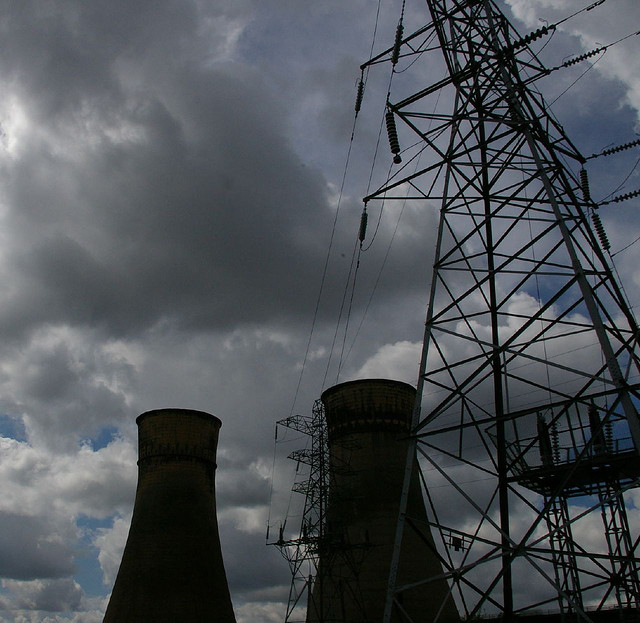
The industrial model of the power grid -- massive generating stations, massive distribution lines, is failing all over the world. An option, largely untried: make your energy where you live and work. (Photo by underclassrising.net/flickr)
Much of the world is slowly losing the struggle to supply its people with the electricity required to maintain the industrial lifestyle. Heat waves and droughts — made worse by industry’s profligate burning of fossil fuels — are at the same time increasing demand for air conditioning and reducing the supply of hydro power. Other sources of electricity — fossil-fuel burning and nuclear fission — are afflicted by rising prices and more frequent disasters.
United States consumers have not yet felt the sting of the double whammy — rising prices for scarcer supplies — in either energy or food to the extent that poorer populations have, and remain secure in their belief that only the other end of the boat is sinking. But even a casual survey reveals that the other end of the boat is very low in the water indeed.
Perhaps the most afflicted country at the moment, electrically speaking, is Pakistan where the Chairman of the National Power Authority says the country is only producing half of its generating capacity due to the lack of money to pay for fuel. Foreign investors have started to transfer their operations to other Asian countries due to the prolonged power outages. One estimate has Pakistan’s industrial production down by 20 to 25 percent, with 400,000 people out of jobs. With 15-20 hours of loadshedding taking place in most areas, many businesses are turning to diesel generators, but this is a major drain on the economy.
Japan’s energy problems are not quite so bad, but are increasing. Last week another Japanese nuclear power reactor was shut down due to a malfunction. With only 19 of 54 nuclear reactors running, Japan is facing electricity shortages, and the government has instituted a 15 percent cut in electricity use by large users in eastern Japan. Temperatures are high in Japan, and the country may suffer the hottest summer on record, raising fears of heat stroke deaths. There are already reports of Japanese manufacturers considering moving production overseas where the electric power situation is better.
A survey of some of the other ongoing energy crises, in alphabetical order:
Argentina, South America’s second-largest economy, is rationing natural gas through the cold months (it’s winter there).
Bahamas, at the peak of summer, now have rolling blackouts.
China’s continued economic growth — nearly 10% in the first half of 2011, with a consequent 12% increase in demand for electricity, has led to the most serious power shortages across the country since 2004.
Dubai, part of the United Arab Emirates (UAE), stopped supplying gasoline to the other emirates, because the government can’t afford to continue subsidizing gasoline, which it currently sells at far below global market rates.
Kuwait’s Ministry of Electricity and Water is being denounced by legislators for widespread rolling blackouts — a regular annual feature of life in the country — just as the summer’s high temperatures hit.
Mozambique has grounded airline fights due to a jet fuel shortage.
South Africa, which has been suffering from electricity shortages for year, is now additionally paralyzed by an ongoing strike that has caused a two-week gasoline shortage. Hundreds of fuel stations have no supplies at all, and those that do have enormous lines of desperate motorists.
Tanzania, east Africa’s second-largest economy, is facing indefinite power outages as a result of fuel shortages as well as drought—which has cut power output from the hydroelectric dams that supply more than half its power.
Uganda has 12 hours a day of load shedding as it cannot pay for fuel.
Yemen’s economy is on the edge of collapse after months of political turmoil, attacks on electricity plants and oil pipelines. The country is grappling with electricity blackouts, rising food prices, and fuel shortages so dire that ordinary Yemenis can spend days in lines for gasoline.
Let’s change metaphors, and ask the question this way: How many canaries have to go toes-up before the miners get the idea?
You can avoid reality, but you cannot avoid the consequences of avoiding reality – Ayn Rand